“And so it went, sand piling up to the heavens and homes sinking toward hell.” — Hugh Howey, Sand Omnibus
 Sand Omnibus
Sand Omnibus
Hugh Howey
![]()
I looked at the different ways readers categorized this book, and one label I didn’t see was Young Adult. That surprises me. Sand has many of the elements of YA fiction: teenaged protagonists, coming-of-age subplots, dastardly villains, complicated family relationships with equal elements of hate and love, dawnings of physical desire, first encounters with betrayal and death, looming disaster staved off by the aforementioned teenagers, and a quest.
These elements, so characteristic of YA fiction, are the same elements that make Sand a rip-roarin’ story. Seriously, once started I could not put this book down. This story will make a hell of a movie, and I hope that happens some day.
I first encountered Hugh Howey through his massive Wool trilogy, originally a collection of shorter stories. I was enthralled with the underground-silo civilization he constructed out of thin air. Great characters, great action, great ideas, great story-telling all around.
Sand—like Wool a collection of shorter stories now assembled in what Howey calls an omnibus—is far shorter, but like Wool, it presents a future civilization that is complete and fully realized.
My only wish is that it were longer. I didn’t want it to end!
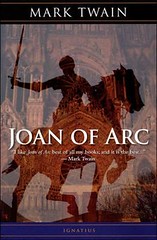 Joan of Arc
Joan of Arc
Mark Twain
![]()
This novel is in the public domain and can be read free on line. Nevertheless I paid B&N $1.99 for a Nook copy that turned out to be full of optical character recognition scanning errors. If you want to read it yourself, I recommend you do a Google search and find a free copy. Don’t pay for a bunch of typos like I did. Now that that unpleasantness is out of the way, my review of a classic that somehow eluded me until now.
I finished Joan of Arc in a mixed state of amazement and confusion. Amazed that the actual person, Joan of Arc, did everything they say she did; confused by (and convinced of) Mark Twain’s love and admiration, his uncritical acceptance of her beliefs.
I always regarded Joan of Arc as semi-legendary. Not quite wholly fictional, like King Arthur; more like a Catholic saint (which she is, by the way), an actual historical figure who, over centuries, became larger than life through the accretion of unverifiable accounts of miracles.
But no. Joan not only existed, she was all the things legend says she was: the uneducated and illiterate peasant girl who, at the age of 17, led French armies against occupying British armies during the Hundred Years’ War, the victorious general who ran the British out of Orléans and Reims and was responsible for transforming Charles VII, the Dauphine, into the legitimately crowned King of France. The girl who, at the age of 19, was burned at the stake by a Burgundian French bishop allied with the British while Charles VII and the armies Joan had raised for him stood by and did nothing. Her life and accomplishments are documented fact.
They say that what one man can do, so can another. But has there ever, before or since, been another Joan of Arc? Can you name another instance where kings and generals turned over leadership and military strategy to an untrained teenager, let alone a woman? Joan’s historicity alone beggars the imagination. And yet! She existed! She came out of nowhere, convinced kings and generals to let her lead armies and plan military operations—and won!
I’m equally staggered Mark Twain wrote this book (and considered it his best work). Twain researched and wrote The Personal Recollections of Joan of Arc, by the Sieur Louis de Conte (its full title) late in life, long after he had abandoned religion and become an atheist. Unaccountably, he picked as the subject of his research and devotion a superstitious peasant girl who believed in God, archangels, fairies, demons, and the Devil himself, a girl who spoke to saints and angels and maintained to the death that everything she did was at the personal direction of God Himself, a girl who lived in an era when everyone took as a given the day-to-day intervention of God and Satan in worldly affairs, a girl who was tried and burned as a witch.
None of this seems like anything the mature Twain would be interested in, but his love of Joan jumps out from every page. You can tell by the reading that Twain was genuinely moved by Joan and the story of her life and deeds. The only way I can interpret Twain’s embrace of Joan is to speculate that while he didn’t share her beliefs, and in fact rejected the existence of God and therefore everything that underpinned Joan’s life, he accepted that she herself did believe, acting sincerely in accordance with her beliefs in every aspect of her life—and that he admired her for precisely that.
Many say Joan of Arc is unlike the rest of Twain’s work, but I disagree. His dry cynicism, so familiar from his earlier journalistic writing, is on display when he relates the actions and motivations of the little men who cheered Joan on in victory and betrayed her in defeat. What makes Joan of Arc so different is Twain’s adoration of his subject, and large parts of the book are uncharacteristically hagiographic. Granted, Twain speaks through a narrator, the Sieur Louis de Conte, Joan’s childhood friend, later her secretary and scribe during the military campaigns, a man utterly devoted to Joan and quite in love with her. Really, though, it is Twain’s love of Joan that shows through on every page, and no one who reads the book will dispute that. In a way, this may be the most personal thing Twain ever wrote.
I finish this review as amazed and confused as when I started. The book is profoundly affecting. I’m an atheist like Twain; like Twain I’ve fallen in love with Saint Joan.
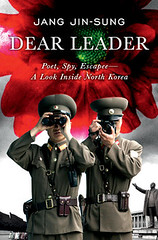 Dear Leader
Dear Leader
Jang Jin-Sung
![]()
I’ve read several nonfiction books purporting to explain life inside North Korea, but only one other by an actual defector. That book was Escape from Camp 14: One Man’s Remarkable Odyssey from North Korea to Freedom in the West. It was the story of Shin Dong-hyuk, as told to American journalist Blaine Harden, who actually wrote the book. My review of Escape from Camp 14 included these comments:
“An interesting but curiously flat and skimpy retelling of a North Korean prison camp escapee’s story. Something is missing here—I expected a more dramatic, more compelling story. And this one is necessarily full of holes, because the escapee shares only the basic outline of his tale with the American journalist who tells it. He never really opens up, and my reaction is one of suspicion—not of the journalist, but of the escapee himself. He says any other prisoner would have done what he did, ratting out his mother and brother to prison guards and then watching their execution. He says he felt nothing, that he did what he was trained to do. And yet he knows what he did was shameful and wrong, because for months afterward he lied about it. We are told that no one—not one person, ever—has escaped from this particular prison camp. Yet members of his own imprisoned family almost casually, it seems, planned an escape, and his own escape and travel to China sounds suspiciously easy (he lingered in the village next to the camp for several days, and no one came looking for him? Give me a break). These parts of his story ring false.”
This defector’s tale is different. One, it was written by the defector, Jang Jin-Sung, himself. Two, the defector was an educated man, a party cadre, and a high-level member of North Korea’s leadership, one of the “admitted,” a man who had not only met the Dear Leader, Kim Jong-Il, but who lived and worked under the Dear Leader’s personal protection as his poet laureate. In addition to his duties as state poet, he worked in the only North Korean party agency with access to information from the outside world. He was remarkably well-placed, a trusted inner-circle functionary, probably one of the most high-value defectors ever to escape the regime.
And three, there was nothing “suspiciously easy” about Jang Jin-Sung’s escape. I have always understood that North Korea has agents in the Chinese border region, placed there to capture escapees, and that China takes an active role in helping NK track them down. What I didn’t know was just how extensive the dragnet is: between NK and China, it is incredibly difficult for escapees to evade capture in the border regions and make it all the way to the South Korean embassy in Beijing (and even there, hundreds of miles from NK, many are captured and turned back over to NK agents)—yet thousands of incredibly brave and determined escapees have made their way to freedom.
Jang Jin-Sung almost didn’t. He escaped along with a friend, another member of the inner circle. As soon as they crossed over the frozen Tumen river into China, the North Korean government alerted Chinese authorities they were wanted for murder, and they had to evade an intense manhunt. They were able to get limited and begrudging help from a few ethnic Korean Chinese citizens, but generally faced nothing but distrust and threats to turn them in. Jang Jin-Sung’s friend was eventually cornered and jumped to his death off a cliff to avoid capture. Thirty-seven days after crossing into China Jang Jin-Sung finally was able to contact a South Korean journalist working in Beijing, a man who immediately realized the value of what Jang Jin-Sung knew and put him in touch with South Korean intelligence agents who were able to sneak him past Chinese guards into the embassy in Beijing.
The escape & evasion portion of the book is one cliff-hanger after another, guaranteed to keep you on the edge of your seat. Equally riveting is what Jang Jin-Sung reveals about the inner workings of NK’s leadership: how Kim Jong-Il, about to be supplanted as Kim Il-Sung’s dynastic successor by a half-brother, worked behind the scenes to elevate the party over the military, creating the personality cult of Kim Il-Sung while at the same time making the Great Leader a figurehead and himself, the Dear Leader, the actual ruler, pulling all the strands from the center of the web. He explains how Kim Jong-Il’s feckless mismanagement created the famine of the late 1990s; how NK’s apparently self-destructive strategies in dealing with the outside world and South Korea (asking for aid while at the same time provoking military confrontations with the South Korean Navy) were perceived by the leadership as the smart thing to do; how NK internal propaganda and almost all the articles about the outside world in the NK press are wholly written from scratch by anonymous men working for various NK propaganda agencies.
What drove this well-placed, comfortable member of the inner circle to defect? A vacation visit to his home town at the height of the famine, and the sudden realization that everything about North Korea was a lie. Or so he says. Yes, I don’t fully trust this defector either. I have to assume he whitewashes his own actions, both before and after his defection, and that we’re hearing only those parts of the story he wants us to hear. One detail that sticks with me: he had been living with his parents before his defection, and although he iterates several examples of NK’s official “guilt by association” policy, wherein entire families are arrested and sent to prison camps for crimes committed by a single family member, he never mentions the fate of his mother and father, never speculates about what may have happened to them after his escape.
The contrast between what this defector says about how the government of North Korea works and the speculations offered by outsiders in those other nonfiction books I mentioned at the beginning of this review is a stark one. Outsiders truly cannot understand how things really work in that benighted country. What this guy says rings true. Of course I don’t know whether or not it is true, but once he made it to Seoul he was debriefed for eight months, and North Korea has openly said he’s marked for assassination. Those are, to me, persuasive arguments in his favor.
If you’re the least bit interested in North Korea, this book needs to be on your reading list.
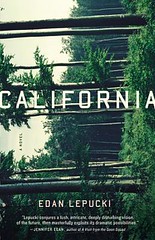 California
California
Edan Lepucki
![]()
A post-apocalyptic drama set on a small stage, California follows the survivalist existence of a young couple, Cal and Frida, who abandon the collapsed city of Los Angeles and move to the woods to eke out a life. As the novel progresses we learn details of the couple’s earlier life and their connections to a Weather Underground-like movement called The Group. The couple eventually leave their forest home and connect with a larger group of survivors in a fortified encampment where they encounter a figure from their shared past—and The Group.
Edan Lepucki gives us just enough information about the novel’s world for us to grasp the larger outlines: the economy has failed, along with it government, roads, schools, commerce, hospitals; the rich live in guarded, walled enclaves; those left outside the walls scrabble for shelter and food. Pirates roam the land.
The novel is tightly centered on Cal and Frida and doesn’t stray far from them; moreover. everything that happens to Cal and Frida occurs within a ten-mile radius of the shed in the forest where we first meet them. Though more limited in scale, California evokes Walter Miller’s classic A Canticle for Liebowitz and Margaret Atwood’s MaddAdam novels. It is more directly connected to such post-apocalyptic novels as Cormac McCarthy’s The Road, Jim Crace’s The Pesthouse, and Chang-rae Lee’s On Such a Full Sea.
What makes this novel hard to put down is a constant level of tension and threat. Something bad is always lurking nearby, whether it’s Mother Nature, marauding pirates, the strangely hostile fellow survivors in the encampment, or Micah, brother to Frida and former classmate of Cal, a shadowy figure with a violent past. Cal and Frida gradually piece things together from snippets of information they gather but do not necessarily share with one another; this adds to the tension.
My only quibble? Realism. I lived in California and at one time had a house in the woods in the foothills of the Sierra Nevadas. The place is crawling with survivalists; I cannot imagine being able to isolate myself in the wilderness in any apocalyptic scenario—there’d inevitably be hundreds of other survivors trying to crash my party.
I thought California was a very good read. Maybe not deserving of the “Colbert Bump,” which really should have gone to Margaret Atwood (get on that, Stephen), but pretty darn good nonetheless.
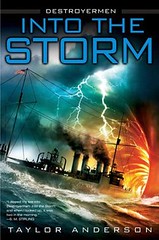 Into the Storm (Destroyermen #1)
Into the Storm (Destroyermen #1)
Taylor Anderson
![]()
Alternate world science fiction, and fairly decent. The novel begins on an old American “four-stacker” destroyer in the middle of a WWII naval battle somewhere in the Indonesian archipelago. Attempting to run into a squall to escape pursuing Japanese warships, the crew of the USS Walker find themselves in a alternate world, one where evolution took a different turn. They escape almost certain death at the hands of the Imperial Japanese Navy only to find themselves facing the Grik.
Sure, it sounds silly, but this is well-written science fiction with fully developed, believable human characters, better than much of the alternate world SF I’ve read, and if I ever find myself short of something to read (an unlikely possibility, considering my current backlog), I’ll pick up the second novel in this series, just to catch up with the characters, find out how they’re doing, and see what happens next.
If I was a writer, I don’t know how I’d decide where to break between novels in a series. I wouldn’t want to leave readers in the lurch, but at the same time I’d want to implant a few threads suggesting where the next novel, and the one after that, might be going, enough to keep readers’ interests engaged so that they’d buy the rest of the series. I think Taylor Anderson ended this first of (three?) novels at just the right place, after a climactic first battle with the Grik. As I mentioned, I too want to find out what happens next—but if I never get around to reading the other novels in this series, I won’t feel let down. This one stood up on its own, a satisfying and fun read.
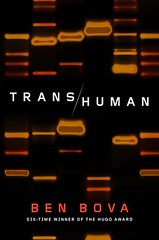 Transhuman
Transhuman
Ben Bova
![]()
I saw this Ben Bova novel at the library and picked it up on reflex, Bova being in my memory a decent science fiction writer. Transhuman turned out to be a great disappointment. Bova is endlessly repetitive, revisiting background and plot points again and again as if he doesn’t think the reader can be expected to remember from one page to the next that Luke doesn’t want his granddaughter to die from cancer or that the treatment he intends to give her inhibits cell growth. He plows these two particular plot points over so many times they almost turn to dust and blow away.
Bova has a thing about ethnicity and race. The coding is what you notice first: if Bova doesn’t describe a character’s race or ethnicity, he or she is white. Otherwise, he goes out of his way to identify blacks as black; Hispanics as Hispanics. If this served the story somehow, it might be valid, but at no point is a character’s race or ethnicity relevant to anything: why, for example, do we need to know that a blonde woman is of Italian heritage, or that the color of her hair a surprise to Luke? Why do we need to know that a nurse, a throwaway character whose entire contribution to the story is contained in one sentence, is black and overweight? Is Luke a bigot, or Ben Bova? At first I thought Bova was working under the theory that diversity sells, but in a later chapter he labels a woman’s genetic makeup the result of “generations of miscegenation,” and the stink of racism virtually wafts from the page.
Bova’s idea of creating a native American character is to give him a black ponytail and have him say he likes flatbread. Otherwise he’s indistinguishable from any other male character in the book. Female characters are likewise interchangeable, and in an epic bit of shallowness, every one of them wants to get in Luke’s pants.
This is poor, poor stuff. It’s not even science fiction, more of a medical/car chase mashup thriller, third-rate Michael Crichton. I can’t believe I read it all the way through, but maybe I just wanted to get it over with.